Psychology
Brake Reaction Time
In the mid 1930s, Dr. Harry DeSilva of the Massachusetts State College at Amherst created a brake reaction test to measure how quickly drivers can step on the brake in response to a red light. He took it around the country and tested thousands of people.People in their mid 20s generally had the quickest reaction times, and then times declined with age, which wasn't a surprise. Slightly more surprising was that short people generally had faster responses than tall people. From Time magazine (Aug 1935):
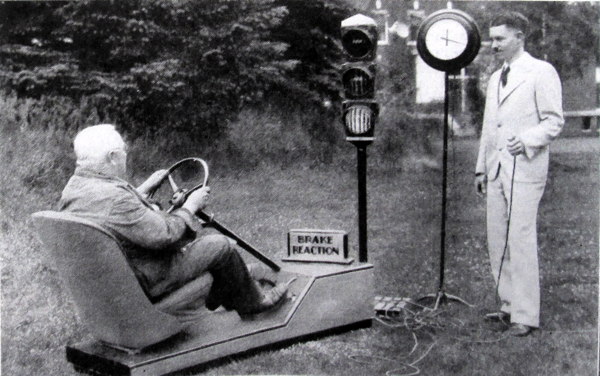
Time - Aug 26, 1935
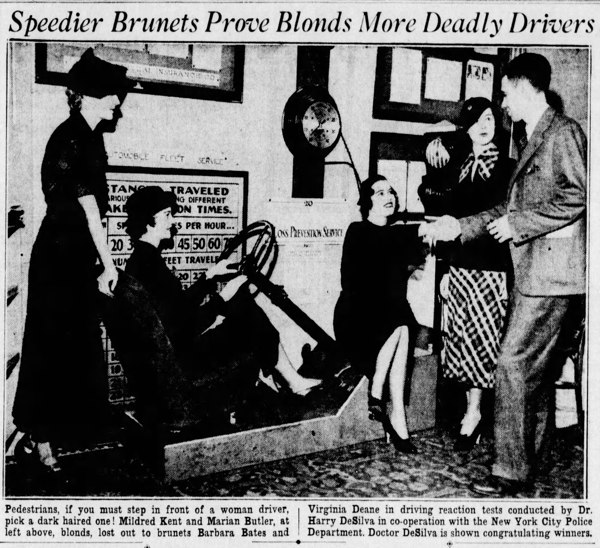
Democrat and Chronicle - Mar 15, 1936
Posted By: Alex - Fri Mar 17, 2017 -
Comments (4)
Category: Motor Vehicles, Cars, Psychology, 1930s
Miniature Driving School
Back in the 1930s, if a Detroit judge suspected a driver was mentally unfit to be on the road, he might send the driver to see Dr. Lowell Selling, who would test the driver using a miniature street intersection to simulate various situations. However, I'm not sure what exactly this testing involved, beyond that vague description.I found a brief note about Dr. Selling in the Law Enforcement Executive Forum (2008, pdf, p.51):
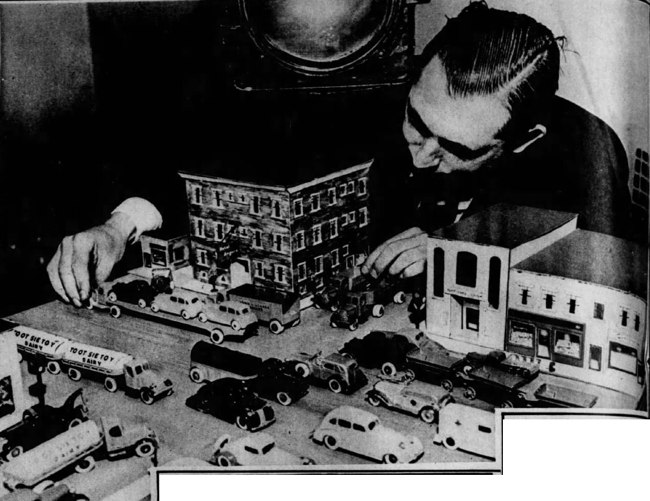
St. Louis Post-Dispatch - Sep 13, 1936
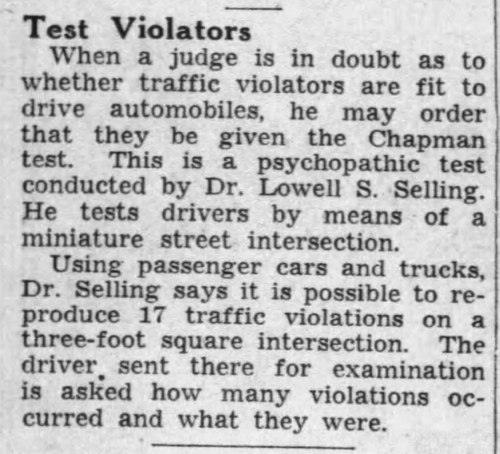
Palladium-Item - Oct 21, 1936
Posted By: Alex - Thu Jan 19, 2017 -
Comments (2)
Category: Motor Vehicles, Psychology, 1930s
The Production of Warts by Suggestion
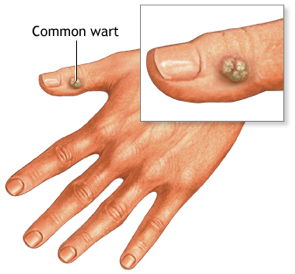
Gravitz wasn't actually doing this himself, but he reported that back in the early 20th century (and presumably earlier as well) creating warts was a popular pasttime among girls in the Swiss canton of Vaud:
He noted that such practices were a form of amusement among the Vaudois girls who derived pleasure from passing their own warts on to someone else. "A ribbon is tied around the affected hand, and is knotted as many times as there are warts on the hand; then the ribbon is dropped on the highway. Whoever picks it up and unties the knots, will get the warts, and the original owner of the warts will be cured."
Posted By: Alex - Mon Jun 06, 2016 -
Comments (9)
Category: Science, Psychology, Skin and Skin Conditions
Negative ESP
Some people who take ESP tests score so badly that ESP researchers have theorized that their low scores can't be attributable to chance alone. These low-scorers must be using "Negative ESP' to avoid getting correct answers.This phenomenon is also known as "psi-missing." You can find a discussion of it in the Introduction to Parapsychology textbook.
I realize now that this must be why I manage to ALWAYS pick the slowest checkout line at the grocery store. It's not bad luck. I've got Negative ESP!
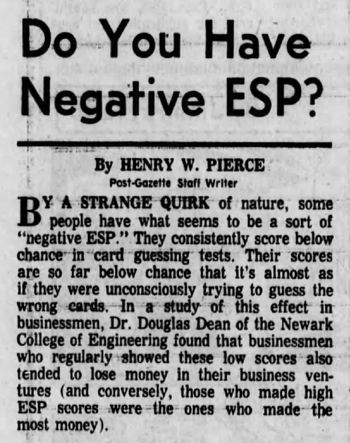
Pittsburgh Post-Gazette - Jan 19, 1972
Posted By: Alex - Wed May 11, 2016 -
Comments (9)
Category: Paranormal, Psychology
Teacher hypnotizes students, 1958
In 1958, Dr. David Briggs claimed that hypnotizing his students increased their academic performance by up to 15 percent.Reminded me of the Hypnotizing High School Principal I posted about back in October. The difference being that in the 1950s a professor hypnotizing his students was seen as a quirky but harmless experiment. But a principal who did essentially the same thing in the 21st Century got accused of contributing to the deaths of his students.
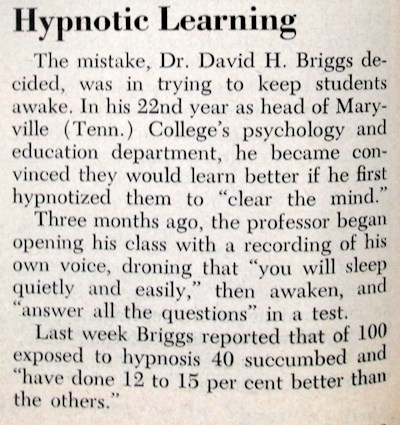
Newsweek - Apr 14, 1958
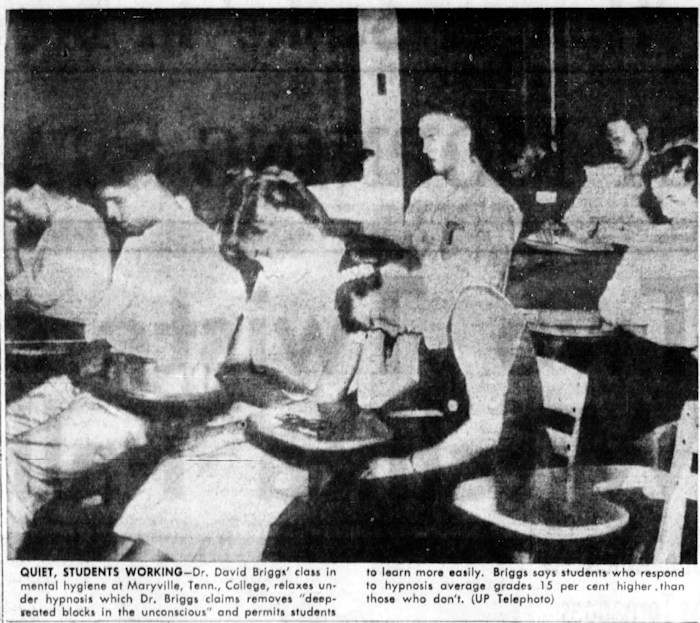
Valley Morning Star (Harlingen, Texas) - Apr 3, 1958
Posted By: Alex - Thu Dec 03, 2015 -
Comments (9)
Category: Education, Hypnotism, Mesmerism and Mind Control, Psychology, 1950s
Hypnotizing High School Principal

The case against Kenney is that the hypnosis may have been a causal factor in the deaths because it somehow messed up the fragile brains of the teenagers. Dr. Alan Waldman, a specialist in neuropsychiatry, testified that, "The wires that connect the neurons are still getting the fatty covering that insulates them. It doesn't stop forming till the early 20s. And they're a child's brain. That's a factor."
More info: gainesville.com, Huff Post.
Posted By: Alex - Sun Oct 11, 2015 -
Comments (5)
Category: Education, Hypnotism, Mesmerism and Mind Control, Psychology
Auroratone
Auroratone was a "process for translating music into color" invented circa 1940 by Englishman Cecil Stokes. The music vibrated an emulsion of crystallizing chemicals, and this was then photographed by a color movie camera, producing a kind of psychedelic movie of shifting colors synchronized with music (but this was the 1940s, before the concept of psychedelics was known in popular culture).The hope was that these auroratone films could be used to treat psychiatric patients, and they were experimentally shown to soldiers in an army hospital suffering from psychotic depressions. Conclusion: "Observation revealed that these patients were intensely absorbed in the films, that their span of attention to the films was appreciably lengthened after exposure to the films. Weeping and sobbing was observed in some patients. Many patients became more accessible to individual and group psychotherapy immediately folllowing exposure to these films."
Their effect was also tested on juvenile delinquents. One kid told the experimenter, "I think God must have painted those pictures."
A company was formed to commercialize Auroratones and guide their development. Investors in this company included the Crosby Brothers (Larry and his famous brother Bing). Bing sang the music for many of the auroratones.
Treating psychiatric patients wasn't very profitable, so there was hope to find more lucrative applications of the auroratone process. One idea was to transfer auroratone color patterns onto textiles and ceramics. Some silk scarfs printed with visualizations of Bing Crosby singing "Home on the Range" were apparently manufactured, but never sold.
Not many auroratones still survive, but an example of one can be viewed on YouTube:
The auroratone process reminds me of the Clavilux (or Color Organ) invented by Thomas Wilfred in 1919 (previously posted about here).
More info about auroratones: Wikipedia and Milwaukee Journal, Dec 6, 1948.
Also see: Rubin, HE & Katz, E. (Oct 1946). "Auroratone films for the treatment of psychotic depressions in an army general hospital," Journal of Clinical Psychology, 2(4): 333-340.
Posted By: Alex - Thu Sep 03, 2015 -
Comments (9)
Category: Movies, Photography and Photographers, Psychology, 1940s
Brains and Bust Size — one medical opinion
Back in 1964, Dr. Erwin O. Strassmann of Houston kicked up a controversy by suggesting there was a correlation in women between bust size and I.Q. And he managed to get his opinion published in a peer-reviewed journal.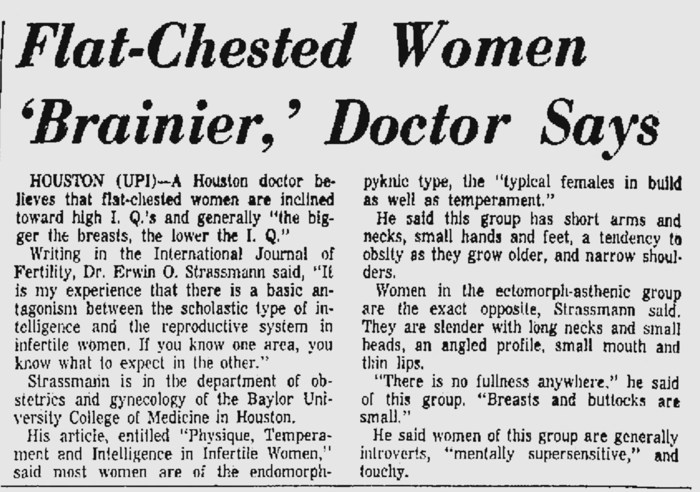
Kingsport Times-News - Aug 30, 1964
Curious to see exactly what he said, I tracked down his article. Turns out he was an enthusiastic follower of the now-discredited theory of "constitutional psychology." This was an effort to establish a link between body type and personality traits. Critics have dismissed it as an extended exercise in dressing up cultural stereotypes (such as, if you're overweight, you're lazy) in scientific language. For devotees of weird science, the entire field is a goldmine of strangeness.
Here's the relevant section of Strassmann's 1964 article:


Strassmann, E.O. (1964). "Physique, Temperament, and Intelligence in Infertile Women." International Journal of Fertility. 9:297-314.
Posted By: Alex - Thu Aug 27, 2015 -
Comments (12)
Category: Body, Brain, Science, Psychology, 1960s
Subconscious Menu
Pizza Hut is testing a new "subconscious menu" in some of its UK restaurants. Just look at the food choices on the screen of the tablet, and the eye-tracking technology will determine which food your eyes are lingering over longest. [wash post]This made me think of Paul's post from a few days ago about the octopus in the farm yard, which demonstrated that our eyes "dwell on objects that are discrepant with expectations." So if there's an octopus on the menu, you'll just have to eat octopus pizza.
Posted By: Alex - Wed Dec 03, 2014 -
Comments (9)
Category: Food, Psychology, Eyes and Vision
Camp Bed Wet
The ad for this camp is via The Retroist, who unfortunately didn't supply a date.I'm curious what went on at this camp. Was it just like a normal camp but with plastic sheets on the bed? Did it actually help bed-wetters overcome their problem?
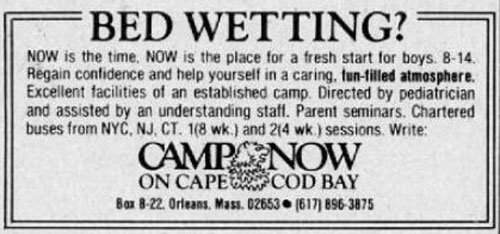
Posted By: Alex - Thu Aug 21, 2014 -
Comments (8)
Category: Psychology

| Who We Are |
|---|
| Alex Boese Alex is the creator and curator of the Museum of Hoaxes. He's also the author of various weird, non-fiction, science-themed books such as Elephants on Acid and Psychedelic Apes. Paul Di Filippo Paul has been paid to put weird ideas into fictional form for over thirty years, in his career as a noted science fiction writer. He has recently begun blogging on many curious topics with three fellow writers at The Inferior 4+1. Contact Us |




